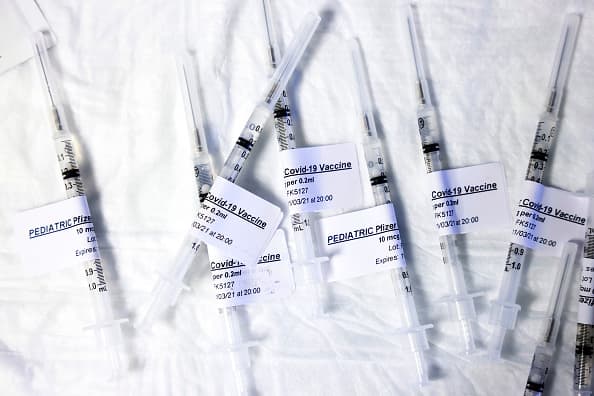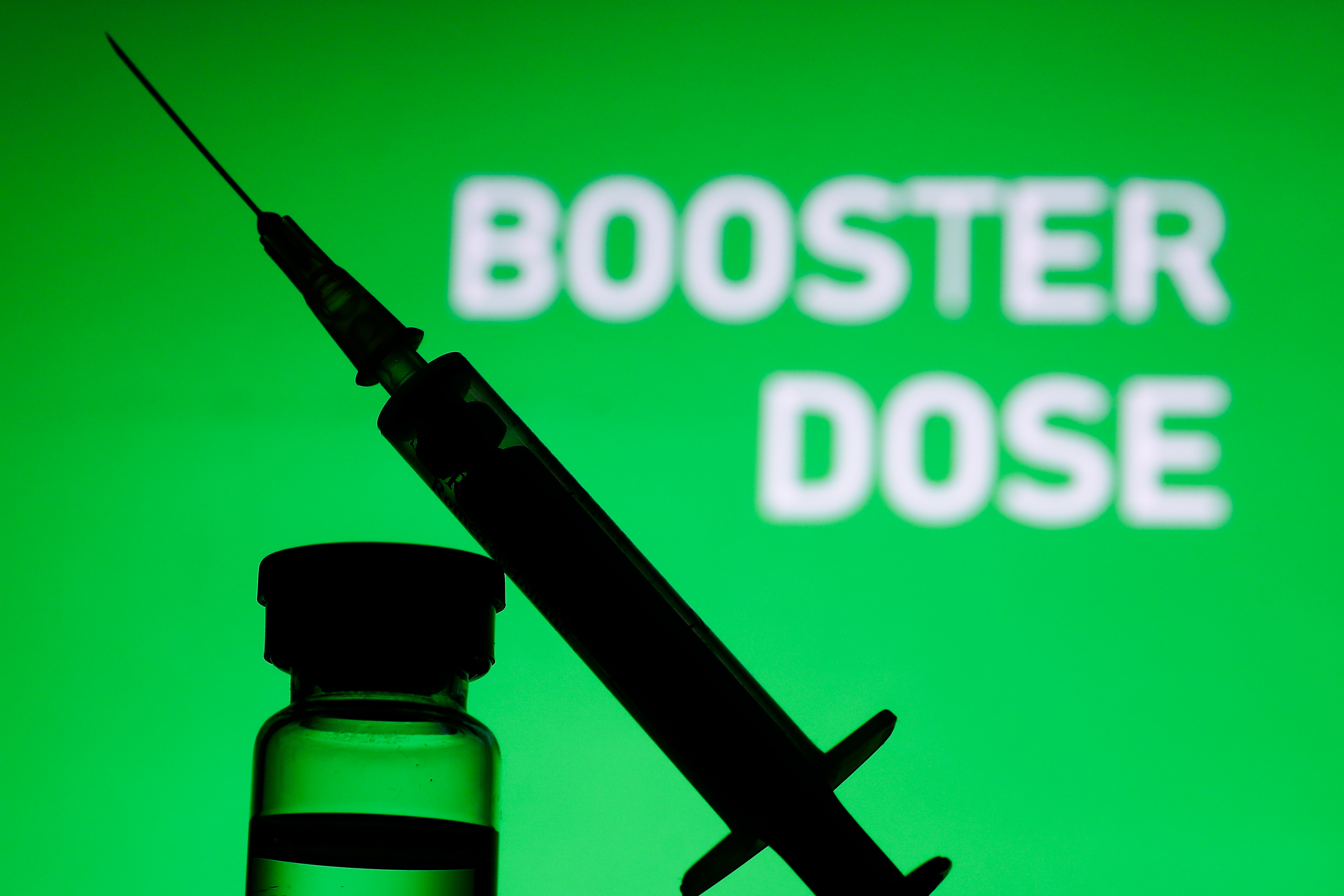As global concern over omicron continues, vaccine makers Moderna and Pfizer say they are studying vaccine effectiveness against the COVID variant.
But health experts have said it will take time to understand how the new ‘variant of concern,’ first discovered in South Africa, may affect diagnostics, therapeutics and vaccines.
Moderna’s Chief Medical Officer Paul Burton said Sunday the vaccine maker could roll out a reformulated vaccine against the omicron COVID variant early next year.
The vaccine maker “mobilized hundreds” of workers last week on Thanksgiving to start studying the new variant, the company said in a statement. But it’s not yet clear whether new formulations will be needed, or if current COVID vaccinations will provide protection against the new variant.
Why Getting a COVID Test Won’t Tell You Which Variant You May Have
“If we have to make a brand new vaccine I think that’s going to be early 2022 before that’s really going to be available in large quantities,” the Moderna chief added.
Current vaccines could provide some protection, depending on how long ago a person was injected, Burton said. Still, he said unvaccinated people should get vaccinated or receive their booster shots, if eligible.
What are doctors saying about the omicron variant and vaccines?
Local and national health experts and doctors have weighed in on vaccines and the omicron variant, but there’s still much to be learned.
The leading infectious disease expert for the U.S., Dr. Anthony Fauci, said public health experts are trying to find answers to questions surrounding the variant — like whether omicron causes more severe illness, and whether it can evade protection from vaccines or treatments.
How Worried Should You Be About New Omicron COVID Variant? Chicago Docs Explain
“[The omicron variant] has a bunch of mutations that would suggest it could evade the protection, for example, of monoclonal antibodies and perhaps even convalescent plasma for people who have been infected and recovered, and possibly vaccine. These are all maybes, but the suggestion is enough,” Fauci said.
Similarly, Dr. Rachel Rubin, the Co-Lead and Senior Medical Officer for the Cook County Department of Public Health, said “we won’t know for a couple weeks” if the omicron variant has a greater ability to infect.
“We know vaccines greatly reduce the risk of infection and transmission, and until we know more about how Omicron interacts with current vaccines, we won’t be able to answer this specific question with much confidence.”
According to Dr. Emily Landon, infectious disease specialist and chief hospital epidemiologist at University of Chicago Medicine, the mutations seen in the variant might be concerning, but it’s too soon to tell.
“We just don’t know yet,” Landon said. “All we know is really the basic science,” said Dr. Emily Landon, infectious disease specialist and chief hospital epidemiologist at University of Chicago Medicine.
“That means that we know the sequence of the virus and that means we can tell what the spike protein looks like compared to what the usual spike protein looks like. The mutations that are present in the spike protein are concerning. Some of them are the same ones that have made delta variant very, very transmissible. There are also additional changes in the spike protein that we’re seeing in the beta variant and the lambda variant. Those are the two that we were concerned might be able to bypass immunity from the vaccine.”
When might we know how the omicron variant interacts with vaccines?
Rubin said we will probably know “within a couple of weeks” if the current COVID-19 vaccines we have — Moderna, Pfizer and Johnson & Johnson — are effective against the omicron variant.
“This time frame will be able to tell us how many breakthrough cases there are at the same time as laboratory investigation is underway,” Rubin said.
Either way, Chicago health officials are stressing the importance of mask wearing and getting vaccinated, and the COVID booster as the best form of protection from COVID-19 and any of its variants.
Delta vs. Omicron Variant Symptoms: How New COVID Variant Might Differ From Previous Cases
“At this point, there are many questions which scientists across the world, and at the Chicago Department of Public Health, are actively working to address all while closely monitoring this strain,” a statement from the department read.
“While that work continues, we must as a city, and importantly as individuals, continue to follow the public health guidance: get vaccinated, and if vaccinated, get your booster; wear a mask indoors and when you’re around other people; and if you are feeling sick, stay home to save lives. The unvaccinated remain the most at risk to themselves and others so please get vaccinated as soon as possible.”
Currently, Illinois is one of only six states with a mask mandate in place. And the CDC recently strongly recommended COVID booster shots for all adults.
Does it matter which COVID booster vaccine you get?
The CDC hasn’t explicitly recommend anyone get a different brand than they started with but left open the option — saying only that a booster of some sort was recommended.
Federal regulators have recommended getting the same shot as your first dose for booster doses, particularly for those who got an mRNA vaccine. Moderna’s booster dose will be half of its original dosing, while Pfizer’s booster shot is the same as the initial doses.
Some advisers, however, said they would prefer that J&J recipients receive a competitor’s booster, citing preliminary data from an ongoing government study that suggested a bigger boost in virus-fighting antibodies from that combination.
“If you got Johnson and Johnson, I have been advising folks if they got J&J, depending on the reason they chose J&J the first time, if they’re going to get that booster I’ve been recommending getting likely one of the mRNA series – the Moderna or the Pfizer,” Chicago Department of Public Health Commissioner Dr. Allison Arwady said. “That’s where we saw the biggest increase in antibodies in the studies.”
What are the most common side effects of COVID booster shots?
According to the Centers for Disease Control and Prevention, symptoms of the booster appear to largely mirror how people felt after their second dose.
The side effects were mostly considered mild or moderate, and arm pain, fatigue and headache were the most commonly reported symptoms after the third shot.
Where in Chicago Can You Get a COVID Booster Shot?
The most common side effects reported after getting a third shot of an mRNA vaccine, the type made by Moderna and Pfizer, were pain at the injection site, fatigue, muscle pain, headache and fever, followed by chills and nausea, according to CDC data.
The data available for J&J was more limited, but people reported fever, fatigue and headache after receiving a second dose of that vaccine, according to the agency.
from NBC Chicago https://ift.tt/3llYUiy




No comments:
Post a Comment